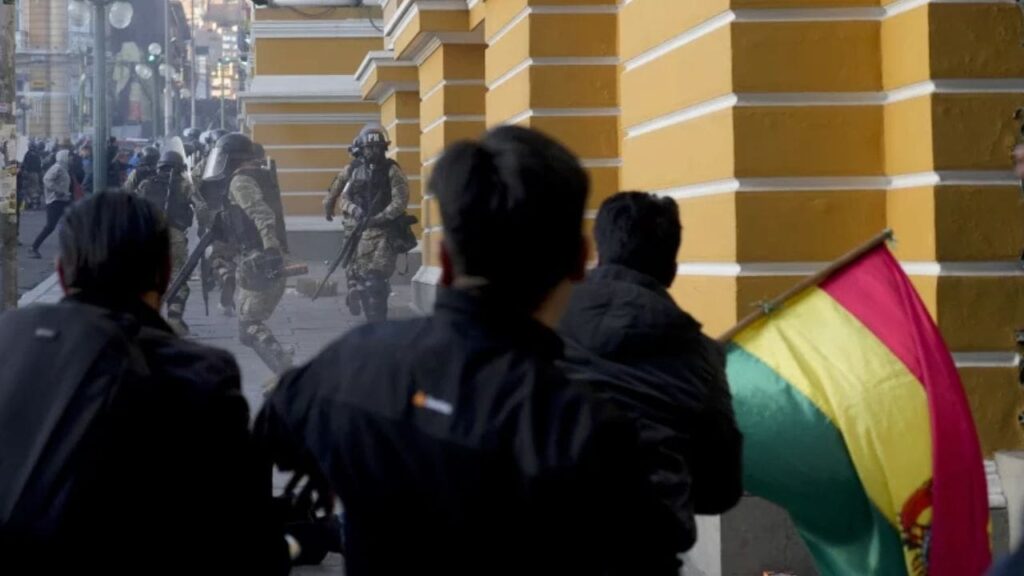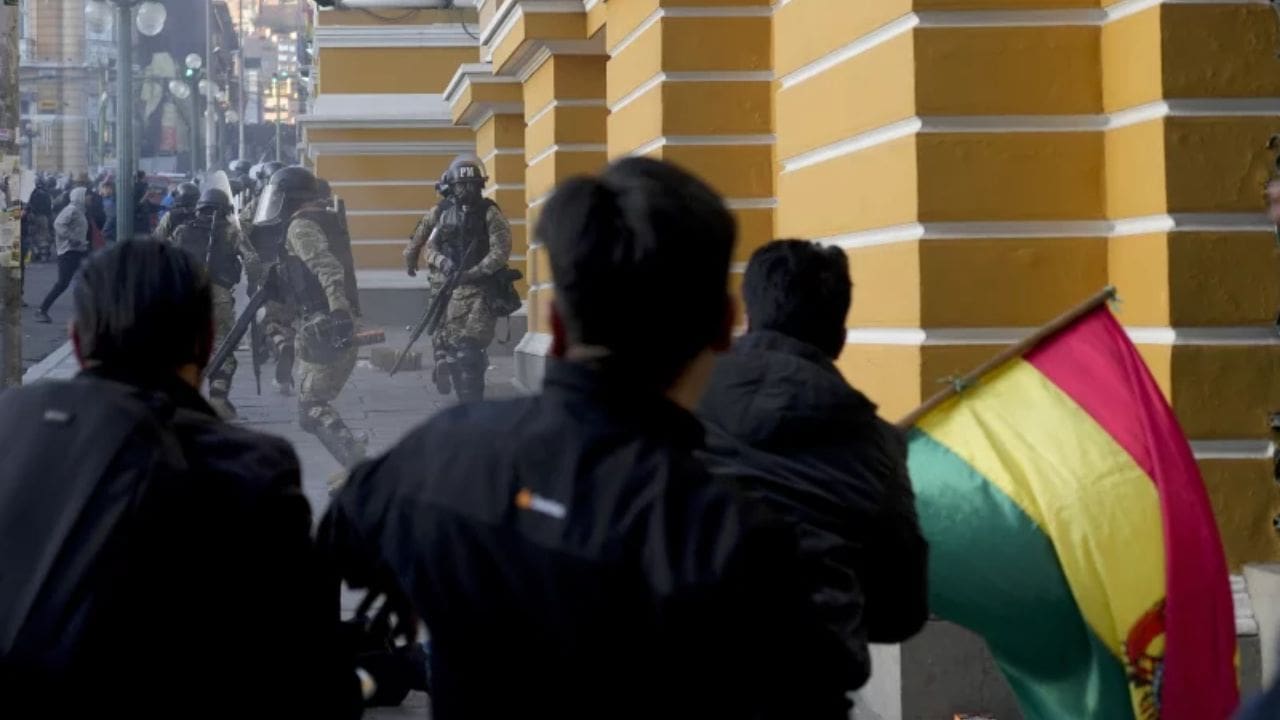Bolivia coup attempt, Luis Arce, Juan José Zúñiga, Bolivian military, political crisis in Bolivia, Bolivia government palace, failed coup Bolivia, Bolivian democracy, Evo Morales, Movement for Socialism, Bolivian political unrest
Read about the dramatic failed coup attempt in Bolivia where armored vehicles stormed the government palace. President Luis Arce’s swift actions and the arrest of General Juan José Zúñiga highlight the ongoing political tensions and economic challenges facing the nation. Discover the implications for Bolivia’s future in this detailed analysis.

Military Flees Bolivia Government Palace, General in Custody After Coup Attempt Fails
LA PAZ, Bolivia — Armored vehicles rammed the doors of Bolivia’s government palace Wednesday in an apparent coup attempt, but President Luis Arce vowed to stand firm and named a new army commander who ordered troops to stand down. The dramatic series of events highlighted the political instability and growing tensions in the country, bringing back memories of past upheavals and raising questions about the future of Bolivia’s democracy.
The Coup Attempt Unfolds
The coup attempt began when armored vehicles stormed the government palace’s gates, causing a significant commotion. President Arce, however, refused to back down. He swiftly appointed a new army commander who ordered the troops to withdraw. This decisive action by Arce, coupled with the support of his followers, played a crucial role in defusing the situation.
Soon after, soldiers and military vehicles retreated as hundreds of Arce’s supporters flooded the square outside the palace. Waving Bolivian flags, singing the national anthem, and cheering, they expressed their support for the embattled president. Arce, surrounded by his ministers, waved at the crowd and thanked them, asserting the importance of maintaining democracy.
Arrest and Allegations
Hours after the failed coup, the Bolivian general who seemed to be behind the rebellion, Juan José Zúñiga, was arrested following an investigation initiated by the attorney general. The charges against Zúñiga were not immediately clear, but he made a shocking claim before his arrest. Zúñiga alleged that President Arce had orchestrated the coup attempt as a political maneuver to boost his popularity. According to Zúñiga, Arce had instructed him to storm the palace, stating, “The situation is very screwed up, very critical. It is necessary to prepare something to raise my popularity.”
Zúñiga claimed he asked Arce whether he should “take out the armored vehicles,” to which Arce allegedly replied, “Take them out.” However, Justice Minister Iván Lima denied Zúñiga’s accusations, stating that the general was lying and would face justice for his actions. Lima emphasized that prosecutors would seek the maximum sentence of 15 to 20 years in prison for Zúñiga for attacking democracy and the Constitution.
Political Context and Tensions
The failed coup attempt occurred against a backdrop of growing economic hardship and escalating protests in Bolivia. The country has been grappling with a severe economic decline, transitioning from one of the fastest-growing economies in the continent two decades ago to one of its most crisis-stricken. The political landscape has also been marked by a high-profile rift within the governing party, the Movement for Socialism (MAS), between President Arce and his former ally, leftist former President Evo Morales.
This internal strife within MAS has further complicated the political situation, as Arce and Morales vie for control ahead of the 2025 elections. The apparent coup attempt, however, did not garner significant support, with even Arce’s rivals rallying to defend democracy and denounce the uprising. This unity among political factions to uphold democratic principles underscored the gravity of the situation and the desire to avoid a repeat of past political crises.
The Immediate Aftermath
As the coup attempt unfolded, military vehicles flooded into the plaza, creating a tense atmosphere. Before entering the government palace, Zúñiga told journalists that there would soon be a new Cabinet of ministers and that the state could not continue in its current condition. Although Zúñiga did not explicitly declare a coup, he mentioned that the army aimed to “restore democracy and free our political prisoners.”
A pivotal moment occurred when Arce confronted Zúñiga in the palace hallway, as captured on Bolivian television. Arce asserted his authority, stating, “I am your captain, and I order you to withdraw your soldiers, and I will not allow this insubordination.” Arce’s firm stance, along with the support of his ministers, played a crucial role in averting the coup. Less than an hour later, Arce announced the appointment of new heads of the army, navy, and air force amid cheers from his supporters.
The newly named army chief, José Wilson Sánchez, ordered all mobilized troops to return to their units, emphasizing that no one wanted to see the chaotic images playing out in the streets. The armored vehicles eventually retreated from the plaza, followed by military fighters and police in riot gear setting up blockades outside the government palace.
Regional and International Reactions
The coup attempt sparked a wave of outrage from regional leaders and international organizations. The Organization of American States, Chilean President Gabriel Boric, the leader of Honduras, and former Bolivian leaders all condemned the incident. This broad condemnation highlighted the regional and global importance of upholding democratic principles and the rule of law in Bolivia.
Bolivia’s Economic and Political Challenges
Bolivia, a nation of 12 million people, has been experiencing intensifying protests due to the severe economic downturn. The country has shifted from being one of the continent’s fastest-growing economies to one of its most crisis-stricken. The economic hardship has fueled public discontent and protests, adding to the political instability.
The rift within MAS between Arce and Morales has further complicated the political landscape. As they battle for the future of the party, the tensions have spilled over into the broader political arena. The failed coup attempt has exacerbated these tensions, raising concerns about the stability of Bolivia’s democracy and the potential for further unrest.
Public Reaction and Future Implications
Following the chaos on Wednesday, reports emerged of Bolivians stocking up on food and other essentials, fearing further instability. This reaction reflected the deep-seated anxiety among the population about the country’s future. However, Vice President David Choquehuanca sought to reassure the public, vowing that the Bolivian people would never again permit coup attempts.
The failed coup attempt has significant implications for Bolivia’s political future. It has highlighted the deep divisions within the governing party and the broader political landscape. The unity shown by political rivals in defending democracy may provide a glimmer of hope for stability. However, the underlying economic and political challenges remain formidable.
Conclusion
The events of Wednesday underscore the fragility of Bolivia’s democracy and the deep-seated tensions within its political system. President Arce’s decisive actions in the face of the coup attempt, coupled with the support of his followers and regional allies, were crucial in averting a more serious crisis. However, the allegations made by General Zúñiga and the broader context of economic hardship and political strife highlight the ongoing challenges facing Bolivia.
As Bolivia moves forward, the need for political unity, economic recovery, and the strengthening of democratic institutions will be critical. The failed coup attempt serves as a stark reminder of the importance of vigilance in defending democracy and the rule of law. The Bolivian people’s resilience and commitment to democratic principles will be essential in navigating the challenges ahead and ensuring a stable and prosperous future for the country.
Read More
